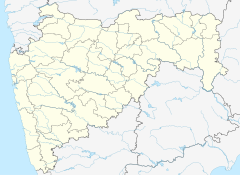Ekvira (also spelled as Ekveera)[1] is a Hindu goddess, regarded to be a form of the goddess Renuka.[2] She is the kuladevi of the Koli people.[3][4] Every year Kolis pay respect to Ekvira and celebrate the festival in Karla Caves.[5]
| Ekvira | |
|---|---|
एकविरा आई | |
 Idol of the goddess | |
| Religion | |
| Affiliation | Hinduism |
| District | Pune |
| Deity | Ekvira Devi |
| Festivals | Navaratri, Chytra Palkhi Festival (March, April) |
| Location | |
| Location | Karla Caves |
| State | Maharashtra |
| Country | India |
Location in Maharashtra | |
| Geographic coordinates | 18°47′00″N 73°28′14″E / 18.78333°N 73.47056°E |
| Architecture | |
| Creator | Koli people |
Temple edit
The Ekvira Aai Mandir is a Hindu temple located near the Karla Caves near Lonavala in Maharashtra, India. Here, the worship of the goddess Ekvira is carried on right next to the caves, once a center of Buddhism. The temple is a prime spot of worship for the Aagri and Koli people. The temple-complex originally consisted of three similar shrines built in a row all facing west. Of these, the central and the southern shrines are preserved in full, and the rest of the structures are preserved only on plan. The maha-mandapa, varsha-mandapa and gopura are situated in front of these three shrines and these three shrines are surrounded by sixteen shrines of additional parivara devatas. The devotees throng the temple on all occasions of Navaratri and Chaitra Navratra to worship and celebrate. It is believed that the goddess has magical powers.[6]
The temple is on a hill. One needs to ascend around 500 steps to reach the temple. It is surrounded by the Karla caves, which are now protected by the Archeological department. While the main deity is Ekvira, she is accompanied by a murti of Jogeśvarī Devi. Ekvira is a Hindu goddess, regarded to be a form of the goddess Renuka. She is the kuladevi of the Koli people.
References edit
- ^ Punekar, Vinaja B. (1959). The Son Kolis of Bombay. New Delhi, India: Popular Book Depot. pp. 160: The deity was the goddess worshipped by Ekveera, who is also mentioned in the Devi Bhāgavata ( Skandha 6, Adhyāya 17 : 23 ) . Jejuri is the seat of Khandobā . The seat of Ekveerā is popularly known as “ Āy Jāge ' ( place of the mother ).
{{cite book}}: CS1 maint: date and year (link) - ^ Saravanan, V. Hari (2014). Gods, Heroes and their Story Tellers: Intangible cultural heritage of South India. Notion Press. ISBN 978-93-84391-49-2.
- ^ Chugh, Lalit (2017-05-23). Karnataka's Rich Heritage – Temple Sculptures & Dancing Apsaras: An Amalgam of Hindu Mythology, Natyasastra and Silpasastra. Notion Press. p. 53. ISBN 978-1-947137-36-3.
- ^ Srinivas, Smriti; Jeychandran, Neelima; Roberts, Allen (2022-10-28). Devotional Spaces of a Global Saint: Shirdi Sai Baba's Presence. Taylor & Francis. ISBN 978-1-000-60406-1.
- ^ Patil, Nilesh (April 17, 2011). "Koli community from Thane pay respect to Ekvira Goddess at annual festival". Mumbai Mirror. Retrieved 2022-10-13.
- ^ Subodh Kapoor (1 July 2002). The Indian Encyclopaedia. Cosmo Publications. p. 2042. ISBN 978-81-7755-257-7. Retrieved 23 April 2012.
